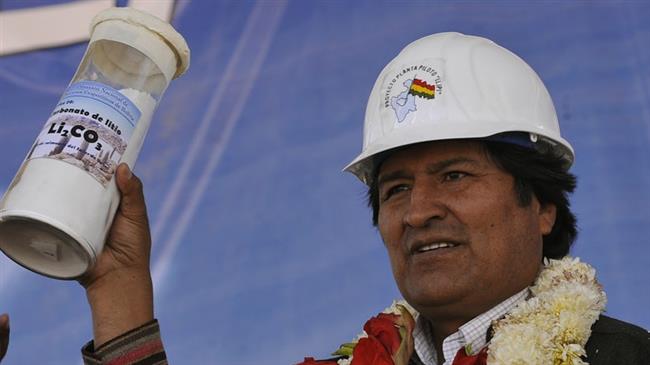Coup in Bolivia aimed at exploiting country’s lithium reserves: Morales
Former Bolivian President Evo Morales has said that a recent political “coup” which forced him to step down was designed to install a leader who will open Bolivia’s lithium reserves to international exploitation.
“In Bolivia we could define the price of lithium for the world...Now I have realized that some industrialized countries do not want competition,” Morales said while speaking with former Ecuadorian President Rafael Correa according to an exclusive RT report published on Thursday.
Morales had been seeking to nationalize the extraction of the country’s lithium reserves in order to "secure the country's future," the RT report wrote.
The president’s tenure, however, was challenged after the US-backed opposition rejected the country’s October 20 election results.
Morales ultimately resigned on November 10 under pressure from Bolivia’s armed forces and went into exile in Mexico.
Morales’ forced resignation came only a week after he canceled a massive joint lithium project with a German company.
RT also reported that the US-based Tesla company, which uses lithium batteries for its electric cars, saw its stock jump after Morales' departure.
Estimated to be at around 900 million tones, Bolivia’s lithium reserves are believed to contain 70 percent of the world’s known lithium, representing a lucrative market for international investors and competitors.
The mineral is essential in the manufacturing of long-lasting batteries and electric cars.
According to a report published by the German carmaker Volkswagen earlier this year, Lithium "will in the near future be one of the most sought-after raw materials on earth.”
The report added that forecasts indicate that demand for the mineral “will more than double by 2023” largely due to the car industry.
Last month, the New York based Bloomberg company also published an article detailing that the “US and Europe fear a lithium supply crunch” as demand for the mineral increases across the world.
VIDEO | Iran-Syria: For Resistance
Qassam Brigades claims killing 3 Israeli troops in northern Gaza
More alive than ever: Sayyed Hassan Nasrallah's legacy grows stronger in martyrdom
Occupation of Syria’s highest peak Mount Hermon part of ‘Greater Israel’ project
Iran: Syrian people will decide their future without foreign interference
IRGC says Iran’s power exceeds borders, warns enemies to adjust themselves
Dozens detained, several wounded in Israeli raids in West Bank
‘Ethnic cleansing’: Hamas blasts Israeli attacks on Gaza hospital amid intl. silence

















 This makes it easy to access the Press TV website
This makes it easy to access the Press TV website